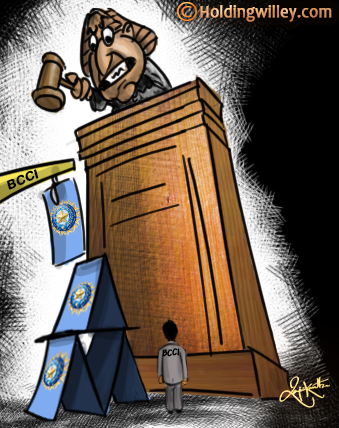 It is telling that it has taken a judicial committee compiling recommendations on how to restructure the BCCI for the BCCI themselves to actually, finally, begin looking within.
It is telling that it has taken a judicial committee compiling recommendations on how to restructure the BCCI for the BCCI themselves to actually, finally, begin looking within.
On Friday (24th July) it was reported by ESPNcricinfo that a letter written by BCCI Secretary Anurag Thakur had been sent to all the BCCI members asking representatives of “every state association, and members of various committees and sub-committees of the BCCI to sign a declaration stating they have no conflicts of interest.” Notably, while it has been common of the BCCI to respond to allegations of conflict of interest in the past by saying that officials have never abused their positions, the letter, according to ESPNcricinfo, “clearly defines conflict of interest as the possibility of bias and not necessarily the exercising of that bias.”
It is impossible not to make a connection between the sending of this letter and the looming presence of the Supreme Court over Indian cricket. Only ten days before the letter was reported, the Supreme Court-appointed Justice RM Lodha Committee ordered the suspension of Chennai Super Kings and Rajasthan Royals for two IPL seasons. Three days before the letter was reported Justice Lodha requested five more months to complete his Supreme Court-appointed report on recommendations for the restructuring of the BCCI.
In the letter itself Thakur acknowledges the board’s need to “protect the reputation and institutional integrity so as to earn broad trust, faith and confidence in all our activities”. Of course, earning the “trust”, “faith” and “confidence” of cricket fans isn’t something the BCCI has seemed particularly keen to “protect” historically - but now that the courts are involved? Well, that’s a different matter.
“
Thakur recognises that conflict of interest issues have led to situations “which we [the BCCI] need to collectively address and avoid for the future to come.” Again, the future is something that the BCCI seem far more concerned about now than they did when they ordered a hand-picked panel to ‘investigate’ corruption in the IPL, which predictably returned with nothing, and was found to be constituted illegally; or when N Srinivasan branded Gurunath Meiyappan as a “cricket enthusiast”; or even when they led a power-grab at the ICC, taking more money for themselves, giving less to developing nations. Justice Lodha casts a long shadow.
”
The letter itself, and the fundamental idea of it, is positive and encouraging. It is stern, thorough, and comprehensive, encapsulating broad, rather than narrow, definitions of conflict of interest. Indeed, now that the Supreme Court is increasingly threatening this may well be a bona fide attempt from the BCCI to clean itself up, but at no point should it be trusted to do so. Indeed, at no point does the letter state what action would be taken if officials did not sign the letter. What’s more, the idea that the BCCI’s problems can be self-diagnosed to merely “conflict of interest” is almost cute. In reality, that particular issue is only scratching the surface of a deep malaise within cricket administration, which is in desperate need of true independence, accountability and cooperation.
It should not have taken a judicial investigation for the BCCI to tackle conflict of interest. That it has, is all the more reason for the Lodha Committee to not recognise this latest profession of integrity and honesty in a positive way. If anything, it should toughen their view. It would almost be appropriate for Thakur to step out onto the runway in Delhi on his way to the Supreme Court of India, waving the note and declaring “peace in our time!” This reactive and belated attempt to avoid trouble is not how any professional organisation, let alone one the size and significance of the BCCI, should be run.
The BCCI has for too long, as have all global cricket boards, acted not in the best interests of the sport and its fans, but in the best interests of a select few individuals seeking financial and hegemonic gain. When last advised on how cricket should be run, the BCCI not only rejected the recommendations, they proceeded to do the exact opposite of what they had been advised. Even if the BCCI’s sudden interest in conflict of interest is the start of a genuine attempt to remedy exploitative and corrupt administration, it is simply a case of too little too late. Justice Lodha and cricket’s fans should not relent.
Change must come, but it cannot be trusted to come from within.